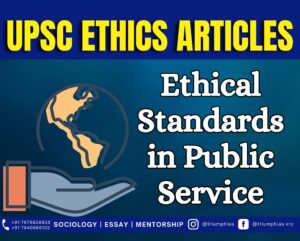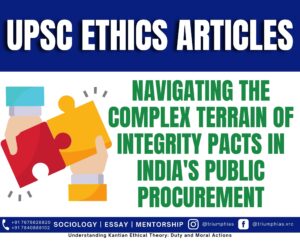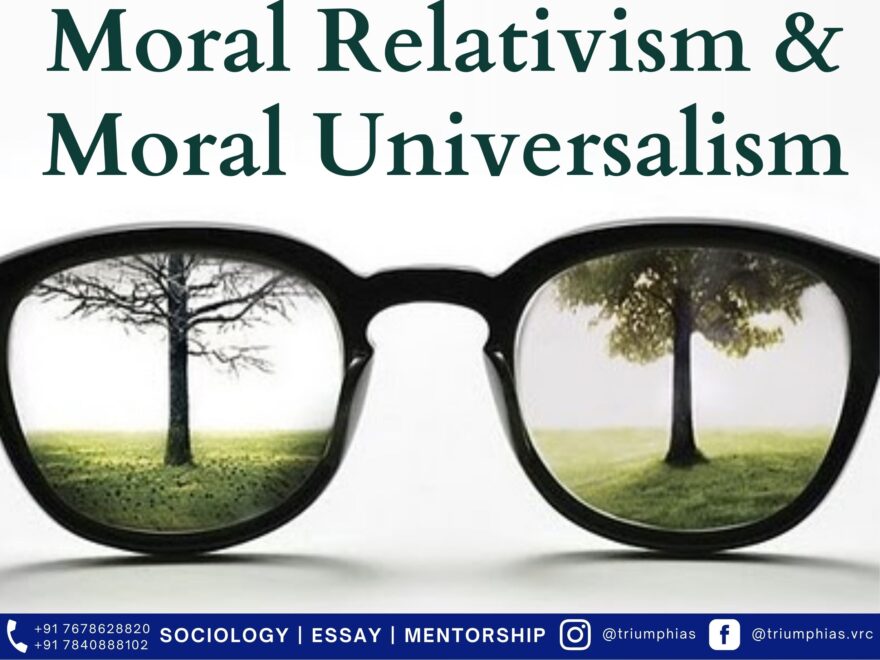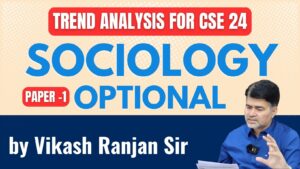Moral Relativism and Moral Universalism
Their Effect on Ethical Decision Making
[Relevant for Public Ethics, Integrity and Aptitude]

Moral Relativism and Moral Universalism represent two divergent ethical perspectives that explore the notion of whether moral principles are contingent on culture, society, or individual viewpoints, or if they are universally applicable to all individuals, irrespective of their cultural or individual distinctions.
Ethics and Morality
Ethics and morality are pivotal concepts that significantly impact the formation of societal values. Although these terms are often used interchangeably, they possess distinct characteristics.
Ethics denotes a collection of moral principles, rules, and guidelines that regulate conduct within a specific community. On the contrary, morality constitutes a framework of moral values and principles that individuals employ to assess the rightness or wrongness of their actions and the actions of others.
The Interplay between Ethics and Morality: The interconnection between ethics and morality is intricate and dynamic. Morality serves as a personal belief system that shapes the ethical choices individuals make. Conversely, ethics has the potential to mold and influence individual moral convictions. In a society, the amalgamated moral beliefs of its members formulate the ethical principles and values guiding behavior. These principles and values, in turn, can impact the moral convictions of individuals, thereby influencing their conduct.
Distinctions between Ethics and Morality: Despite their close association, ethics and morality exhibit disparities. Firstly, ethics is a methodical and organized approach to moral decision-making and behavior, while morality is a personal and individualistic approach to ethics. Secondly, ethics focuses on the rights and needs of others, whereas morality revolves around personal beliefs and values. Thirdly, ethics constitutes a set of principles and values collectively agreed upon by a community, while morality comprises personal beliefs and values that may differ among individuals.
Top of Form
Differences between Moral Relativism and Moral Universalism:
|
|
They influence an individual’s ethical judgments and actions in the following ways:
|
The decision between moral relativism and moral universalism in ethical judgments and actions relies on individual beliefs, cultural background, and the particular circumstances one faces. Finding a middle ground between acknowledging diversity and maintaining core ethical principles is frequently a intricate and continuous ethical dilemma.
(Reference: Static portion)
Frequently Asked Questions:
1. Question: What is moral courage, and why is it essential in civil service?
Answer: Moral courage is the readiness to do what is right, even in challenging situations. It is crucial in civil service to uphold ethical standards and act in the public interest.
2. Question: How does ethics in public administration contribute to social justice in India?
Answer: Ethics in public administration ensures equality and equity for vulnerable sections of society, aligning with the objective of social justice outlined in the Constitution.
3. Question: What distinguishes moral courage from physical courage?
Answer: Moral courage involves confronting ethical or moral challenges, while physical courage deals with facing physical danger.
4. Question: Why is maintaining public trust important in government?
Answer: Maintaining public trust is crucial because it fosters confidence in the competence, fairness, honesty, and sincerity of public services, which are essential for effective governance.
5. Question: Give an example of a civil servant demonstrating moral courage.
Answer: An example is the implementation of the Bonded Labour Abolition Act by IAS officer S. Shankaran, who stood firm in principles despite facing opposition.
Related Blogs …
 |
 |
To master these intricacies and fare well in the Sociology Optional Syllabus, aspiring sociologists might benefit from guidance by the Best Sociology Optional Teacher and participation in the Best Sociology Optional Coaching. These avenues provide comprehensive assistance, ensuring a solid understanding of sociology’s diverse methodologies and techniques.
META TAGS:
Moral Relativism and Moral Universalism , Moral Relativism, Moral Universalism, Public administration, Ethical standards, Public trust, Social justice, Public resource utilization, Decision making, UPSC FAQ sample question, Moral Courage, role of moral courage,

Follow us :
🔎 https://www.instagram.com/triumphias
🔎 https://www.youtube.com/c/TriumphIAS
🔎 https://t.me/VikashRanjanSociology
Find More Blogs…
| Compare and contrast Karl Marx’s and Max weber’s | Karl Marx- Historical Materialism |
| Position of Women In the Modern Indian Society | Sociology: Social system and pattern variables |



